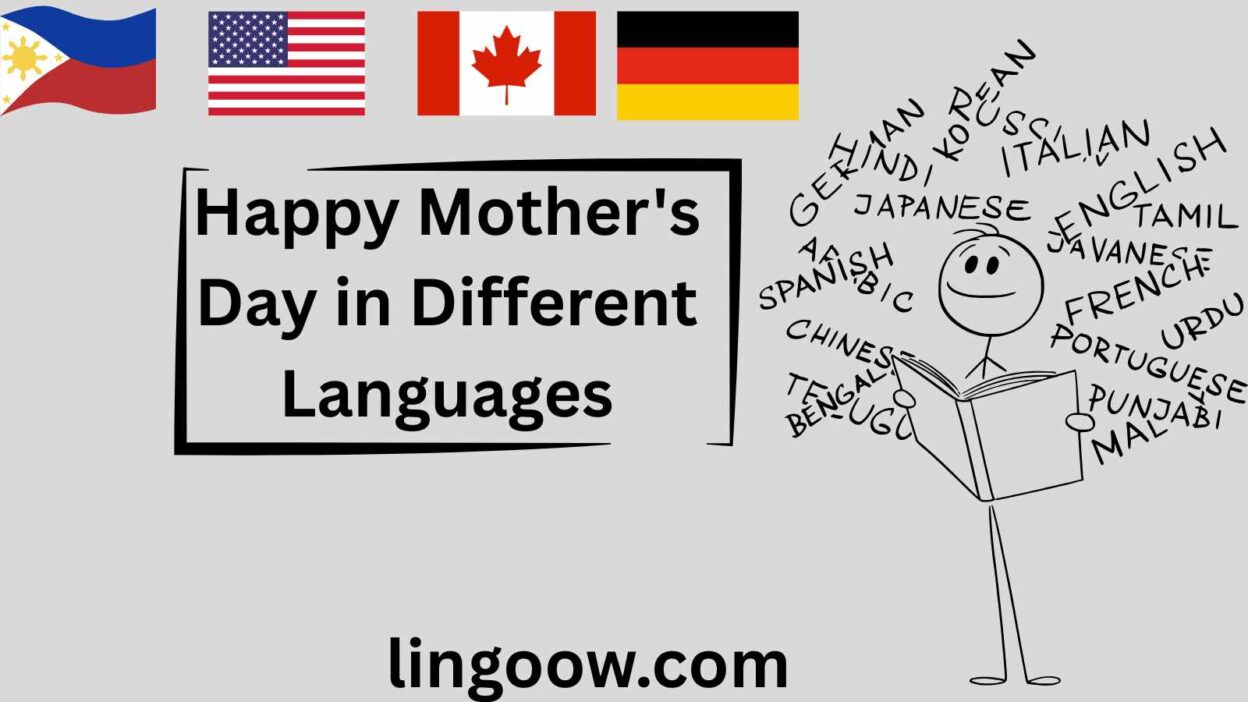Every year, as spring blooms or autumn leaves fall, depending on where you are in the world, families gather to celebrate the heart of their homes:
mothers. I remember my own childhood, watching my mother’s face light up as I handed her a clumsily crafted card, my small hands barely able to spell out “Happy Mother’s Day.”
That simple phrase, scribbled in crayon, carried a weight of love that transcended language.
Across the globe, from bustling cities to remote villages, people express this same sentiment in countless tongues, each phrase a unique melody woven into the universal tapestry of gratitude for mothers.
Mother’s Day is more than a holiday; it’s a global embrace of the women who nurture, sacrifice, and shape us. Whether whispered in Swahili under an African sky or sung in Japanese at a family gathering, the words for “Happy Mother’s Day” carry the same heartbeat: love, respect, and appreciation. In this article, we’ll journey through languages and cultures, exploring how this phrase is spoken and celebrated worldwide, revealing both the diversity and unity of this cherished tradition.
Reference Table: “Happy Mother’s Day” in Different Languages
Below is a table showcasing how “Happy Mother’s Day” is expressed in 15 languages, complete with cultural or linguistic insights.
| Language | Phrase | Cultural/Linguistic Insight |
|---|---|---|
| Spanish | ¡Feliz Día de la Madre! | In Spain and Latin America, Mother’s Day is often tied to religious celebrations, like honoring the Virgin Mary. |
| French | Bonne Fête des Mères! | French celebrations include giving flowers, especially roses, symbolizing love and gratitude. |
| Italian | Buona Festa della Mamma! | Italians often celebrate with family feasts, emphasizing the matriarch’s role in family unity. |
| German | Alles Gute zum Muttertag! | In Germany, Mother’s Day aligns with a focus on family gatherings and heartfelt gifts. |
| Mandarin Chinese | 母亲节快乐! (Mǔqīn jié kuàilè!) | In China, Mother’s Day is a modern holiday, often marked by gifting carnations, symbolizing maternal love. |
| Hindi | मातृ दिवस की शुभकामनाएँ! (Mātr̥ Divas kī śubhakāmanāyēṁ!) | In India, Mother’s Day blends modern celebrations with ancient reverence for maternal deities. |
| Japanese | 母の日おめでとう! (Haha no Hi omedetō!) | Japanese children often gift red carnations, a symbol of love and gratitude for mothers. |
| Korean | 어머니의 날 축하합니다! (Eomeoniui Nal Chukhahamnida!) | In South Korea, Mother’s Day is a major event, with gifts and family outings to honor parents. |
| Arabic | عيد الأم السعيد! (‘Īd al-umm al-sa‘īd!) | In Arab countries, Mother’s Day is celebrated on March 21, often with poetry and family gatherings. |
| Swahili | Siku ya Mama ya Furaha! | In East Africa, Swahili-speaking communities celebrate with communal meals and songs. |
| Zulu | Usuku Lwamamama Olujabulisayo! | In South Africa, Zulu celebrations emphasize storytelling and honoring maternal strength. |
| Yoruba | Ọjọ Iya Dun! | Yoruba culture ties Mother’s Day to deep respect for elders, often marked with prayers. |
| Maori | Rā Whaea Hari! | In New Zealand, Maori celebrations include traditional songs and family gatherings. |
| Hawaiian | Hauʻoli Lā Makuahine! | In Hawaii, leis (flower garlands) are gifted to mothers as a symbol of love and respect. |
| Cherokee | ᎤᏓᏥᏃᎸᎢ ᎤᎵᎮᎵᏍᏗ! (Udatsinolvi Ulihelisdi!) | Cherokee celebrations often involve storytelling and honoring maternal lineage. |
European Languages: A Tapestry of Tradition
In Europe, the phrase “Happy Mother’s Day” reflects both linguistic diversity and shared cultural values. In French, Bonne Fête des Mères is spoken with a warmth that mirrors the country’s love for elegance and sentimentality. French families often celebrate with bouquets of roses or lavender, and children may recite poems or prepare breakfast in bed. In Spanish, ¡Feliz Día de la Madre! resonates across Spain and Latin America, where the holiday often intertwines with Catholic traditions, such as honoring the Virgin Mary. In Spain, it’s celebrated on the first Sunday of May, while in Mexico, May 10 is a fixed date filled with serenades and family feasts.
In Italian, Buona Festa della Mamma is a call to gather around the table, where mothers are celebrated with hearty meals and heartfelt gifts. Italy’s emphasis on family makes this day a cornerstone of cultural life. In German, Alles Gute zum Muttertag! is accompanied by practical yet meaningful gifts, like handmade cards or household help, reflecting Germany’s blend of sentiment and pragmatism. Across these languages, the celebration underscores the mother’s role as the heart of the family, with each culture adding its own flavor—be it poetry, food, or flowers.
Asian Languages: Diverse Expressions of Gratitude
Asia’s linguistic and cultural diversity shines through in how “Happy Mother’s Day” is expressed. In Mandarin Chinese, Mǔqīn jié kuàilè! is a modern phrase reflecting China’s growing embrace of global holidays. Celebrations often involve gifting carnations or taking mothers out for meals, a nod to Confucian values of filial piety. In Hindi, Mātr̥ Divas kī śubhakāmanāyēṁ! is celebrated in India with a blend of modern and traditional elements, often honoring both biological mothers and maternal figures like goddesses Durga or Saraswati. Events may include school performances or temple visits.
In Japanese, Haha no Hi omedetō! is marked by giving red carnations, a symbol of pure love. Families may prepare sushi or bento boxes, emphasizing the mother’s role in nurturing through food. In Korean, Eomeoniui Nal Chukhahamnida! is part of a broader Parents’ Day, where both mothers and fathers are honored with gifts, cards, and outings. In Arabic, spoken across over 20 countries like Egypt, Saudi Arabia, and Morocco, ‘Īd al-umm al-sa‘īd! is celebrated on March 21, often with poetry recitals and family gatherings, reflecting the region’s rich oral traditions. From the Middle East to East Asia, these expressions highlight the deep respect for mothers, tailored to each culture’s unique lens.
African Languages: Celebrating Maternal Strength
Africa’s linguistic diversity offers a vibrant array of ways to say “Happy Mother’s Day.” In Swahili, spoken in over 20 countries like Kenya, Tanzania, and Uganda, Siku ya Mama ya Furaha! is celebrated with communal feasts and songs that honor mothers as community pillars. In Zulu, Usuku Lwamamama Olujabulisayo! reflects South Africa’s emphasis on storytelling, where mothers are celebrated as bearers of wisdom and resilience. Families may gather to share tales of maternal strength, often under the stars.
In Yoruba, spoken in Nigeria and Benin, Ọjọ Iya Dun! is tied to spiritual traditions, with prayers and offerings to honor mothers’ roles in family and society. Across African cultures, Mother’s Day often extends beyond the nuclear family, celebrating aunts, grandmothers, and community matriarchs. These celebrations, whether in bustling Lagos or rural Tanzanian villages, emphasize collective gratitude and the enduring strength of mothers.
Indigenous & Island Languages: Honoring Ancestral Roots
Indigenous and island cultures bring unique perspectives to “Happy Mother’s Day.” In Maori, Rā Whaea Hari! is celebrated in New Zealand with traditional haka performances or family gatherings that honor maternal lineage. In Hawaiian, Hauʻoli Lā Makuahine! is marked by gifting leis, symbolizing love and connection, often during beachside celebrations. In Cherokee, Udatsinolvi Ulihelisdi! reflects a deep respect for mothers as keepers of cultural knowledge, with storytelling and communal meals central to the day.
In Samoan, spoken in Samoa and American Samoa, Aso o Tina Fa’afetai! emphasizes community, with church services and feasts honoring mothers. Across these cultures, spanning over 20 countries and territories like Fiji, Tonga, and Native American communities, the phrase reflects a connection to land, ancestors, and family. These celebrations often blend ancient traditions with modern practices, creating a rich tapestry of gratitude.
Cultural Insights: The Evolution of Mother’s Day
The concept of Mother’s Day has ancient roots, from the Greek worship of Rhea, the mother goddess, to Egypt’s reverence for Isis. In medieval Europe, “Mothering Sunday” was a Christian tradition honoring both mothers and the “Mother Church.” The modern holiday, formalized in the U.S. by Anna Jarvis in 1908, spread globally, adapting to local customs. In Thailand, Mother’s Day coincides with Queen Sirikit’s birthday, blending national pride with maternal reverence. In Ethiopia, Antrosht celebrates mothers with a three-day feast at the end of the rainy season, rooted in communal gratitude.
Linguistically, the phrase “Happy Mother’s Day” often shares roots in Indo-European languages (e.g., “mater” in Latin, “mutter” in German), reflecting ancient connections. In non-Indo-European languages like Arabic or Swahili, the phrase adapts to local phonetic and cultural norms, yet the sentiment remains universal. These linguistic threads weave a story of humanity’s shared reverence for mothers, evolving through history yet anchored in love.
Proverbs: Wisdom About Mothers
Proverbs from around the world capture the universal reverence for mothers:
- Chinese: “A mother’s heart is a child’s schoolroom.” (Reflects the role of mothers as first teachers.)
- Swahili: “Mama ni kama jua; hata usiku anang’aa.” (A mother is like the sun; even at night, she shines.)
- Spanish: “Madre no hay más que una.” (There is only one mother.)
- Yoruba: “Iya ni wura, baba ni digi.” (A mother is gold, a father is a mirror.)
- Maori: “He wahine, he whenua—e ngaro ai te tangata.” (By women and land, men are sustained.)
These sayings, rooted in cultural wisdom, highlight mothers as nurturers, teachers, and pillars of society, their value transcending borders.
FAQs: Common Questions About “Happy Mother’s Day”
Why do the words for “mother” sound similar in many languages? The similarity often stems from the universal “ma” sound, one of the first syllables babies make, linked to breastfeeding or calling for care. Linguists trace this to proto-languages, like “mater” in Indo-European roots.
What’s the oldest known celebration of mothers? Ancient Egyptians honored Isis, the goddess of motherhood, around 2700 BCE, with festivals celebrating her nurturing role. Similar traditions existed in ancient Greece and Rome.
How do cultural differences shape Mother’s Day? In Western countries, Mother’s Day is often commercial, with gifts like flowers or cards. In contrast, African and Asian celebrations may focus on communal feasts, spiritual rituals, or honoring extended family matriarchs.
When is Mother’s Day celebrated? Dates vary: the second Sunday of May in the U.S., Canada, and Australia; March 21 in many Arab countries; and the last Sunday of May in France. Some cultures, like Ethiopia, tie it to seasonal events.
Conclusion: A Universal Tribute
From the vibrant Hauʻoli Lā Makuahine in Hawaii to the heartfelt Mǔqīn jié kuàilè in China, the words for “Happy Mother’s Day” are as diverse as the cultures that speak them.
Yet, beneath this linguistic mosaic lies a universal truth: mothers are the heartbeat of humanity.
Whether celebrated with carnations, prayers, or feasts, the gratitude we express transcends borders, uniting us in a shared language of love.




